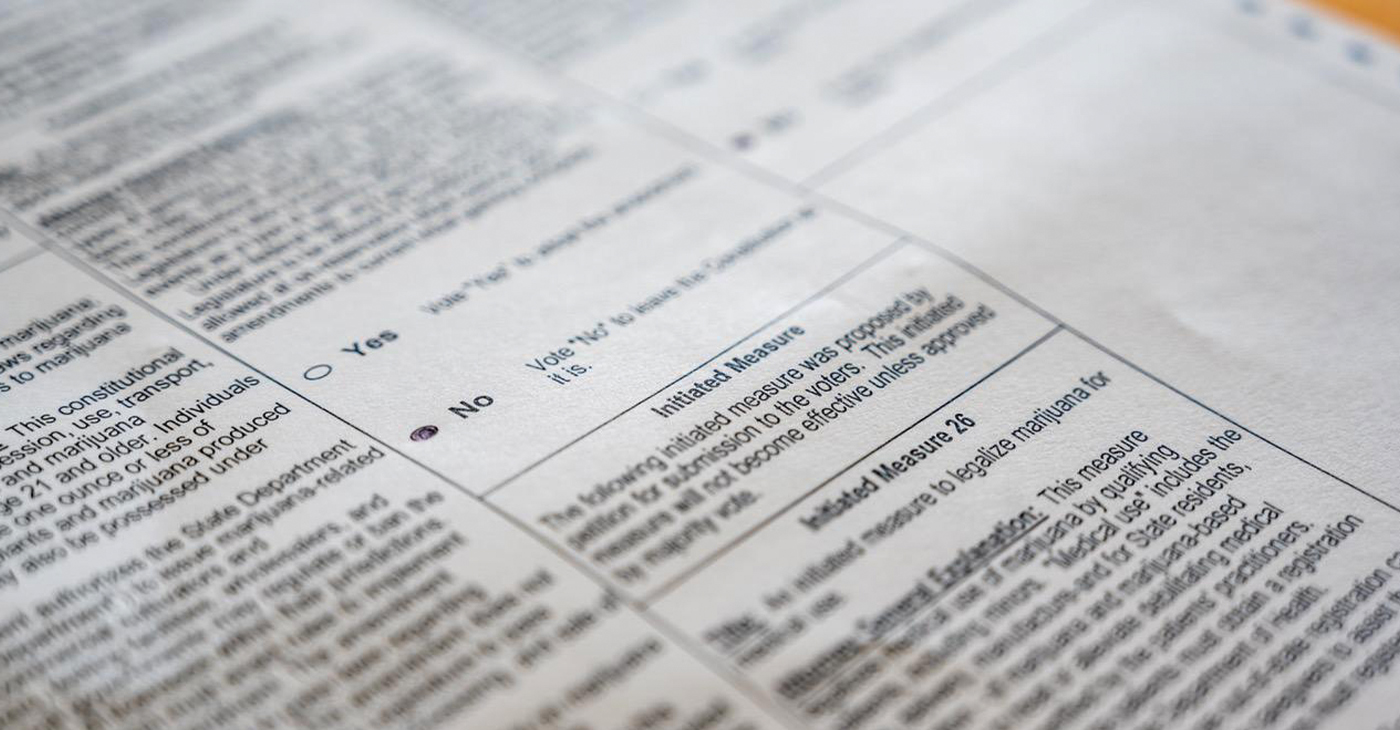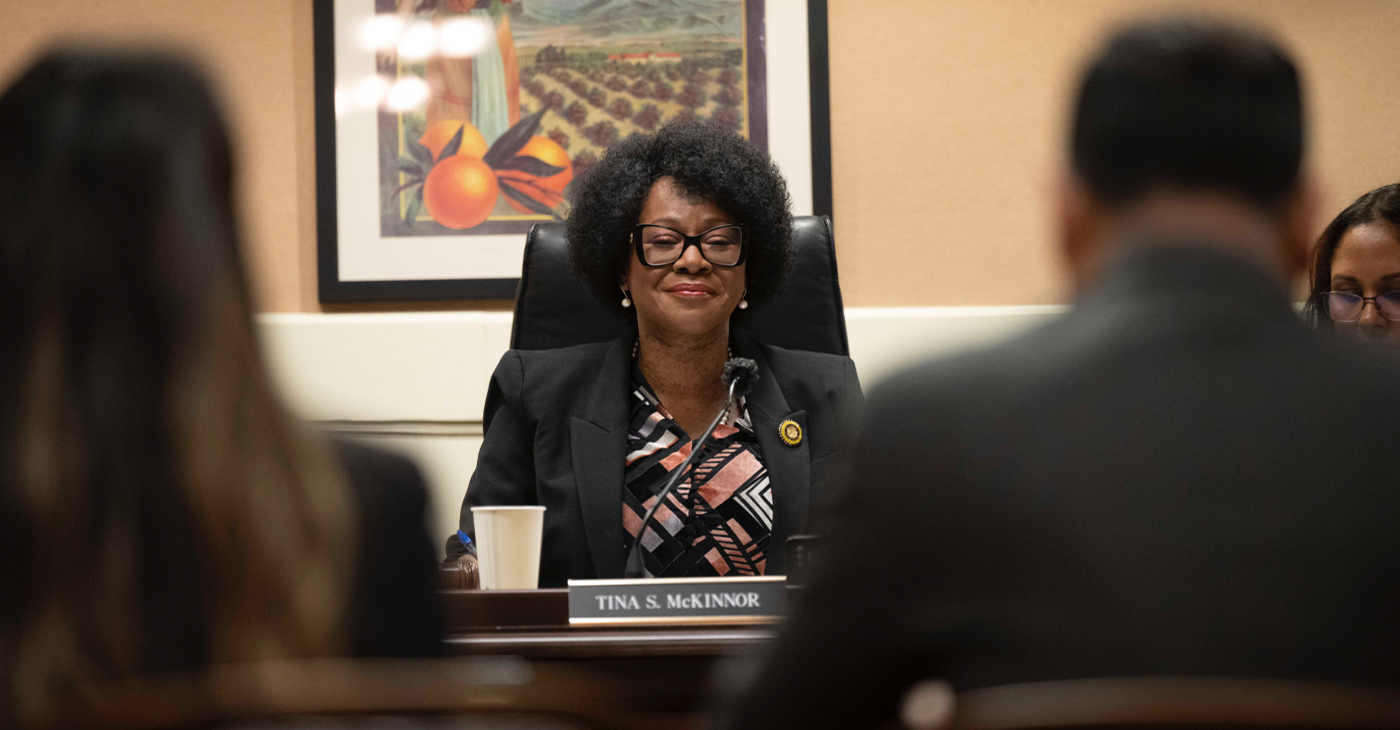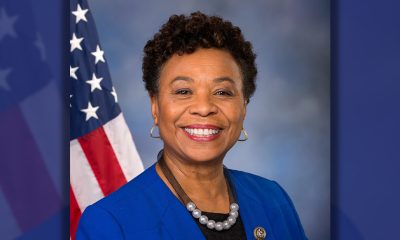California Black Media
Seven Initiatives Qualify for California November Ballot
Special interest groups have raised more than $370 million to convince voters to either pass or reject the initiatives. Over 88% of the money raised is for settling whether two sports betting proposals should be legalized.

By Edward Henderson, California Black Media
The office of California Secretary of State Dr. Shirley N. Webber has qualified seven ballot initiatives for the November 8 statewide General Election. Seven is the lowest number of measures to appear on a statewide general election ballot since 2014.
One initiative is Senate Constitutional Amendment 10 (SCA 10). It is asking voters to safeguard a person’s right to reproductive freedom. To qualify for the November ballot, SCA 10 received the required 2/3 supermajority vote in each chamber of the Legislature.
The other six measures initiated by citizen groups are asking voters to decide on sports betting, funding K-12 art and music education, kidney dialysis clinic requirements, income tax to fund zero-emission vehicle projects, and a flavored-tobacco products ban. To be on the ballot, the initiative proponents were required to gather a minimum of 623,212 signatures verified by county elections officials. June 30 was the deadline for the measures to qualify for the November ballot.
Two other measures could have qualified for the ballot but were withdrawn by their sponsors. An initiative to increase the cap on medical malpractice lawsuits was withdrawn when the sponsors reached agreement with the Legislature and Assembly Bill 35 by Assembly Majority Leader Eloise Gómez Reyes and State Senator Tom Umberg, was passed and signed by Gov. Newsom.
An initiative to reduce plastic waste reduction was withdrawn after it was clear that Senate Bill 54 by State Sen. Ben Allen would pass. Gov. Gavin Newsom signed it into law in June.
Assembly Constitutional Amendment 3 (ACA 3), the California Abolition Act, which would have removed a clause in California’s Constitution that allows the practice of involuntary servitude as a means of punishing crime is not on the ballot because, while it passed the Assembly with the required 2/3 vote, it failed to get enough votes in the Senate.
Special interest groups have raised more than $370 million to convince voters to either pass or reject the initiatives. Over 88% of the money raised is for settling whether two sports betting proposals should be legalized.
The following are details on the fall ballot measures.
Proposition 1 – California Constitutional amendment to prohibit the state from denying an individual’s reproductive freedom
In response to the Supreme Court’s ruling to overturn federal protections for women seeking abortions, California lawmakers proposed a California Constitutional amendment to protect the reproductive freedom of women. Following the Supreme Court’s ruling, Gov. Newsom stated “Abortion is legal in California. It will remain that way. We will not cooperate with any states that attempt to prosecute women or doctors for receiving or providing reproductive care.”
Proposition 26 – Authorizes new types of gambling
This proposition would allow federally recognized Native American tribes to operate dice games, roulette and sports wagering on tribal lands. On-site wagering at privately operated horse-racing tracks in four specified counties for betters 21 years or older would become legal. Prop 26 also imposes a 10% tax on sports-wagering profits at horse-racing tracks and directs portion of revenues to enforcement and problem-gambling programs.
Proposition 27 – Allows online and mobile sports wagering
Currently, sports’ betting online is illegal in California. This proposition would allow Californians 21 and older to place bets online through federally recognized Indian tribes and eligible businesses like Draft Kings and FanDuel. Prop. 27 is estimated to increase state revenues by tens of millions of dollars yearly and potentially direct hundreds of millions of dollars in fee revenue to housing services for homeless Californians.
Proposition 28 – Provides additional funding for arts and music education in public schools
This proposition sponsored by former Los Angeles Unified School District superintendent Austin Butner would require the state to set aside $800 million to $1 billion annually beginning in 2023-24 for arts education in school. A greater proportion of the funds would be allocated to schools serving more economically disadvantaged students.
Proposition 29 – Requires on-site licensed medical professional at kidney dialysis clinics and other state requirements
This measure requires a physician, nurse practitioner, or physician assistant with six months’ relevant experience to be on site during treatment at outpatient kidney dialysis clinics. It authorizes an exemption for staffing shortages if a qualified medical professional is available through telehealth. Prop 29 prohibits clinics from closing or substantially reducing services without state approval and prohibits clinics from refusing to treat patients based on source of payment. This is the third attempt by SEIU United Health Workers West, a union representing over 100,000 health care workers and patients across the state, to pass the measure. Opponents of Prop 29 cite it would cost tens of millions of dollars annually for clinics to implement.
Proposition 30 – Provides funding for programs to reduce greenhouse gas emissions
Individuals with a personal income of over $2 million would receive a tax increase of 1.75% to raise between $3 billion to $4.5 billion a year to fund greenhouse gas initiatives. A majority of the funds would go toward incentives for Californians to buy zero-emission vehicles and build new electric charging or hydrogen fueling stations. Twenty-five percent of the funds would go toward wildfire fighting and prevention initiatives.
Proposition 31 – Referendum challenging a 2020 law prohibiting retail sale of certain flavored tobacco products
This proposition sponsored by the tobacco industry aims to overturn Senate Bill 793 signed by Gov. Gavin Newsom in 2020 banning the sale of all flavored tobacco products. A “yes” vote keeps the law and a “no” vote overturns the law.
California ballot measures require only a simple majority of the votes cast to be approved.
As new initiatives enter circulation, fail, become eligible for, or qualify for an election ballot, the Secretary of State’s office will issue status updates. The updates can be found athttps://www.sos.ca.gov/elections/ballot-measures/initiative-and-referendum-status or here.
Business
Black Business Summit Focuses on Equity, Access and Data
The California African American Chamber of Commerce hosted its second annual “State of the California African American Economy Summit,” with the aim of bolstering Black economic influence through education and fellowship. Held Jan. 24 to Jan. 25 at the Westin Los Angeles Airport Hotel, the convention brought together some of the most influential Black business leaders, policy makers and economic thinkers in the state. The discussions focused on a wide range of economic topics pertinent to California’s African American business community, including policy, government contracts, and equity, and more.

By Solomon O. Smith, California Black Media
The California African American Chamber of Commerce hosted its second annual “State of the California African American Economy Summit,” with the aim of bolstering Black economic influence through education and fellowship.
Held Jan. 24 to Jan. 25 at the Westin Los Angeles Airport Hotel, the convention brought together some of the most influential Black business leaders, policy makers and economic thinkers in the state. The discussions focused on a wide range of economic topics pertinent to California’s African American business community, including policy, government contracts, and equity, and more.
Toks Omishakin, Secretary of the California State Transportation Agency (CALSTA) was a guest at the event. He told attendees about his department’s efforts to increase access for Black business owners.
“One thing I’m taking away from this for sure is we’re going to have to do a better job of connecting through your chambers of all these opportunities of billions of dollars that are coming down the pike. I’m honestly disappointed that people don’t know, so we’ll do better,” said Omishakin.
Lueathel Seawood, the president of the African American Chamber of Commerce of San Joaquin County, expressed frustration with obtaining federal contracts for small businesses, and completing the process. She observed that once a small business was certified as DBE, a Disadvantaged Business Enterprises, there was little help getting to the next step.
Omishakin admitted there is more work to be done to help them complete the process and include them in upcoming projects. However, the high-speed rail system expansion by the California High-Speed Rail Authority has set a goal of 30% participation from small businesses — only 10 percent is set aside for DBE.
The importance of Diversity, Equity and Inclusion (DEI) in economics was reinforced during the “State of the California Economy” talk led by author and economist Julianne Malveaux, and Anthony Asadullah Samad, Executive Director of the Mervyn Dymally African American Political and Economic Institute (MDAAPEI) at California State University, Dominguez Hills.
Assaults on DEI disproportionately affect women of color and Black women, according to Malveaux. When asked what role the loss of DEI might serve in economics, she suggested a more sinister purpose.
“The genesis of all this is anti-blackness. So, your question about how this fits into the economy is economic exclusion, that essentially has been promoted as public policy,” said Malveaux.
The most anticipated speaker at the event was Janice Bryant Howroyd known affectionately to her peers as “JBH.” She is one of the first Black women to run and own a multi-billion-dollar company. Her company ActOne Group, is one of the largest, and most recognized, hiring, staffing and human resources firms in the world. She is the author of “Acting Up” and has a profile on Forbes.
Chairman of the board of directors of the California African American Chamber of Commerce, Timothy Alan Simon, a lawyer and the first Black Appointments Secretary in the Office of the Governor of California, moderated. They discussed the state of Black entrepreneurship in the country and Howroyd gave advice to other business owners.
“We look to inspire and educate,” said Howroyd. “Inspiration is great but when I’ve got people’s attention, I want to teach them something.”
California Black Media
Asm. Tina McKinnor Elected Chair of L.A. Delegation to Legislature
On Jan. 24, the members of the Los Angeles County Delegation (LACD) to the California Legislature elected Assemblymember Tina McKinnor (D-Inglewood) as the group’s chair. McKinnor, who is a member of the California Legislative Black Caucus, will lead the 39-member body, which is comprised of 15 State Senators and 24 State Assemblymembers representing various areas of Los Angeles County.

By California Black Media
On Jan. 24, the members of the Los Angeles County Delegation (LACD) to the California Legislature elected Assemblymember Tina McKinnor (D-Inglewood) as the group’s chair.
McKinnor, who is a member of the California Legislative Black Caucus, will lead the 39-member body, which is comprised of 15 State Senators and 24 State Assemblymembers representing various areas of Los Angeles County.
As LACD chair, McKinnor succeeds Assemblymember Luz Rivas (D-San Fernando Valley).
“I am grateful for the trust legislators from the Los Angeles County Delegation have placed in me to serve as its next Chair,” said McKinnor in a statement.
LACD Vice Chair, Sen. Maria Elena Durazo (D-Los Angeles), said the body, which collectively represents about 10 million people in California’s populous county, is the largest, bi-partisan, and most diverse delegation in the California Legislature.
“Heading into a challenging budget year, the Delegation, and I will be intensely focused on making sure communities throughout Los Angeles County receive the services they need and that we continue our historic investments to address homelessness and the housing affordability crisis in Los Angeles County,” Durazo added.
McKinnor thanked Rivas for her stewardship of the LACD during the last legislative session.
“The Delegation and I are grateful to outgoing Chair, Assemblymember Luz Rivas, for her incredible leadership to the Legislature, the state, and especially the people of Los Angeles County,” said McKinnor.
California Black Media
Anti-Theft Bill with Jail-Time Requirement Gets Wide Ranging Support
Fed up with the alarming frequency of retail theft across California, including smash and grabs, a diverse group of business leaders, law enforcement officials, policymakers and public safety advocates joined their efforts in Sacramento on Jan. 24. Their purpose: to increase public support for Assembly Bill (AB) 1772, a bill that would make jail time mandatory for repeat theft offenders.

By California Black Media
Fed up with the alarming frequency of retail theft across California, including smash and grabs, a diverse group of business leaders, law enforcement officials, policymakers and public safety advocates joined their efforts in Sacramento on Jan. 24.
Their purpose: to increase public support for Assembly Bill (AB) 1772, a bill that would make jail time mandatory for repeat theft offenders.
Co-authored by Assemblymembers James C. Ramos (D-San Bernardino), Avelino Valencia (D-Anaheim) and Devon Mathis (R-Tulare), AB 1772 would require jail time “of one to three years for theft crimes depending upon the circumstances.
“Offenses would include grand theft, theft from an elder or dependent adult, theft or unauthorized use of a vehicle, burglary, carjacking, robbery, receiving stolen property, shoplifting or mail theft,” the bill language reads.
Ramos said the need to act is urgent.
“It’s time for us to reverse the spikes in theft crimes since the pandemic. Our law enforcement members and district attorneys need additional tools such as AB 1772. We must reverse the trend before the problem grows worse. Last year I requested a state audit of the impact of Prop 47 on Riverside and San Bernardino counties,” said Ramos.
Prop 47 is the California initiative, approved by voters in 2014, that reclassified some felonies to misdemeanors and raised the minimum amount for most misdemeanor thefts from $400 to $950.
According to a Public Policy Institute of California (PPIC) report, the rate of occurrence of petty crimes like shoplifting and commercial burglaries have increased by double digits over the last four years.
In Orange County alone, commercial burglaries have spiked by 54%.
“Our communities are experiencing an increase in retail crime and deserve appropriate action from their legislators,” Valencia said.
San Bernardino County Sheriff Shannon Dicus thanked Ramos.
“This bill, designed to impose stricter penalties on serial retail theft suspects, responds urgently to the escalating consequences of shoplifting and related crimes on our communities,” he said.
AB 1772 supporters who spoke at the gathering included Sacramento Sheriff Jim Cooper and San Bernardino Chief of Police Darren Goodman. Listed as supporters are the California State Sheriff’s Association, City of Riverside Police Chief Larry Gonzalez and Redlands Chamber of Commerce.
-

 Activism4 weeks ago
Activism4 weeks agoOakland Post: Week of March 27 – April 2, 2024
-

 #NNPA BlackPress4 weeks ago
#NNPA BlackPress4 weeks agoFrom Raids to Revelations: The Dark Turn in Sean ‘Diddy’ Combs’ Saga
-

 #NNPA BlackPress4 weeks ago
#NNPA BlackPress4 weeks agoCOMMENTARY: D.C. Crime Bill Fails to Address Root Causes of Violence and Incarceration
-

 #NNPA BlackPress4 weeks ago
#NNPA BlackPress4 weeks agoCOMMENTARY: Lady Day and The Lights!
-

 #NNPA BlackPress4 weeks ago
#NNPA BlackPress4 weeks agoMayor, City Council President React to May 31 Closing of Birmingham-Southern College
-

 #NNPA BlackPress4 weeks ago
#NNPA BlackPress4 weeks agoBaltimore Key Bridge Catastrophe: A City’s Heartbreak and a Nation’s Alarm
-

 #NNPA BlackPress4 weeks ago
#NNPA BlackPress4 weeks agoBaltimore’s Key Bridge Struck by Ship, Collapses into Water
-

 #NNPA BlackPress4 weeks ago
#NNPA BlackPress4 weeks agoBeloved Actor and Activist Louis Cameron Gossett Jr. Dies at 87



















































